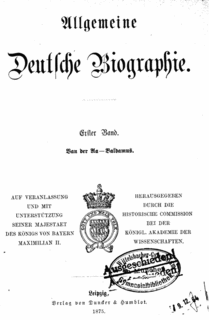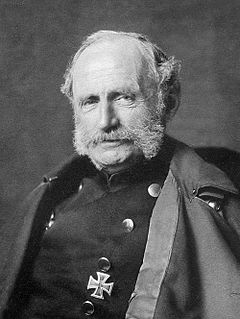
Albert was the King of Saxony and a member of the House of Wettin.

August Wilhelm Antonius Graf Neidhardt von Gneisenau was a Prussian field marshal. He was a prominent figure in the reform of the Prussian military and the War of Liberation.
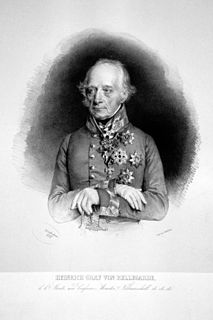
Count Heinrich von Bellegarde, Viceroy of Lombardy-Venetia, of a noble Savoyard family, was born in Saxony, joined the Saxon army and later entered Habsburg military service, where he became a general officer during in the Habsburg border wars, the French Revolutionary Wars and the Napoleonic Wars. He became a Generalfeldmarschall and statesman.

Johann Adolf, Freiherr von Thielmann was a Saxon soldier who served with Saxony, Prussia and France during the Napoleonic Wars.

Friedrich Bertram Sixt von Armin was a German general who participated in the Franco-Prussian War and the First World War. In the latter he participated in many battles on the Western Front, including the Battles of Passchendaele and the Lys.

Frederick Michael, Count Palatine of Zweibrücken-Birkenfeld was a member of the Wittelsbach dynasty. He was the son of Christian III of Palatinate-Zweibrücken and Caroline of Nassau-Saarbrücken and a member of the House of Palatinate-Zweibrücken-Birkenfeld, a branch of the House of Wittelsbach. He was the father of the Bavarian King Maximilian I Joseph.
The Royal Saxon Army was the military force of the Electorate (1682—1807) and later the Kingdom of Saxony (1807—1918). A regular Saxon army was first established in 1682 and it continued to exist until the abolition of the German monarchies in 1918. With the formation of the Confederation of the Rhine by Napoleon the Royal Saxon Army joined the French "Grande Armée" along with 37 other German states.
Lecoq is a surname. Notable people with the surname include:
Friedrich Karl Gustav Freiherr von Langenau, Imperial Field Marshal-Lieutenant, was Quartermaster-General of the Grand Army of Bohemia, in 1814, and Austrian Army of the Upper Rhine, under Schwarzenberg in 1815.

Ludwig Johann Karl Gregor Eusebius Freiherr Roth von Schreckenstein was a Prussian General of the cavalry and Minister of War.
Graf August Karl Wilhelm von Kanitz was a Prussian Lieutenant General and was also the Minister of War from 26 April to 16 June 1848 in the Camphausen-Hansemann government.
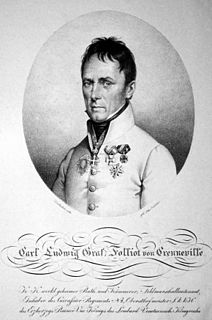
Louis Charles Folliot de Crenneville joined the French royal navy in the 1770s. During the French Revolution he abandoned the First French Republic and became an Émigré. Soon afterward, he tendered his services to Habsburg Austria. He earned promotion to general officer during the Napoleonic Wars and fought in all the major campaigns against his former country. He led a division during the War of the Sixth Coalition and remained in Austrian service until his death.
Karl Ludwig von Lecoq or Karl Ludwig von Le Coq, born 23 September 1754 – died 14 February 1829, of French Huguenot ancestry, first joined the army of the Electorate of Saxony. He later transferred his loyalty to the Kingdom of Prussia and fought during the French Revolutionary Wars, earning a coveted award for bravery. While serving variously as a staff officer and diplomat, he became renowned as an expert cartographer. In 1806 he was entrusted with command of the forces in northwest Germany. Cut off from the main body of the Prussian army after the disaster at the Battle of Jena-Auerstedt, he concentrated his troops in the fortress of Hameln. After a brief siege, he surrendered his troops to an inferior force of enemies. For this, he was sentenced to life imprisonment. However, he was later pardoned and continued his map-making until he went blind.
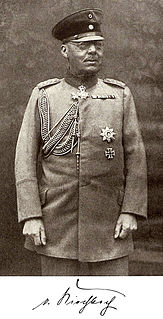
Rudolph Bodo Hans von Kirchbach was a Royal Saxon army officer who was a Generaloberst in the First World War and awarded the Pour le Mérite.

Karl Ludwig d'Elsa was a Royal Saxon army officer who was a Generaloberst in the First World War and awarded the Pour le Mérite.

Max Ferdinand Karl von Boehn was a Prussian officer involved in the Franco-Prussian War and World War I. He held the rank of Generaloberst in World War I.

Johannes Karl Louis Richard Eben, from 1906 named von Eben was a Prussian officer who served as General of Infantry in World War I.
Ernst Christoph von Nassau, sometimes called Christoph Ernst, was a Prussian general lieutenant and knight of the Black Eagle Order. He is memorialized on the Equestrian statue of Frederick the Great. After fighting in the Prussian army during the War of Spanish Succession, he transferred to the Hessian army; subsequently, he served during peacetime in the army of the Duke of Saxony and in 1740, upon the ascension of Frederick in 1740, he rejoined the Prussian army and served in the War of Austrian Succession.
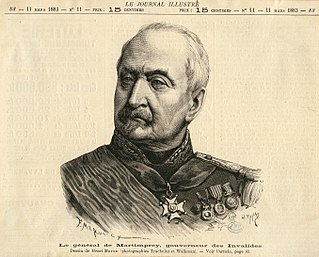
Count Edmond-Charles de Martimprey was a French soldier, briefly Governor General of Algeria, and then Senator of France for the remainder of the Second French Empire.
Querengässer, Alexander: LeCoq. Ein sächsisches Soldatenleben ( Beiträge zur Geschichte des Militärs in Sachsen 1) Berlin 2017.


















